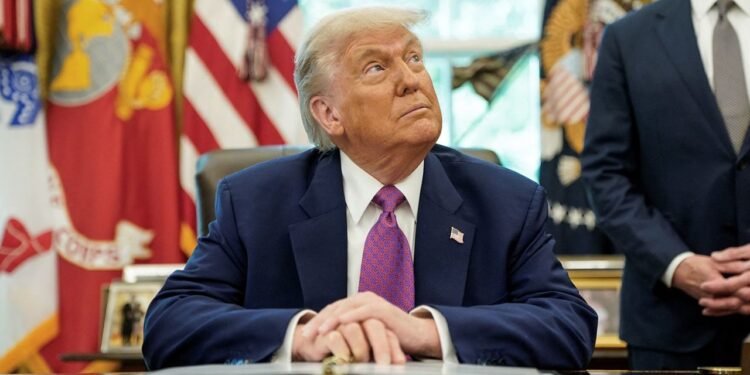Lagatar24 Desk
Washington: Amid escalating tensions with Iran, US President Donald Trump announced on Wednesday that American personnel are being moved out of the Middle East, describing the region as a “dangerous place.” He firmly reiterated that the United States will not permit Iran to acquire nuclear weapons. The decision comes as Washington prepares a partial evacuation of its embassy in Iraq, with voluntary departures authorized for military dependents in Bahrain and Kuwait. The move, confirmed by multiple US and Iraqi officials, has already impacted oil markets, causing crude prices to surge by over 4%.
US Embassies and Military Bases Adjust Operations
The State Department updated its global travel advisory on June 11, citing heightened regional tensions and ordering non-emergency government personnel to depart from several Middle Eastern locations. While the US embassy in Kuwait remains fully operational, American embassies in Baghdad and other regional posts are initiating partial evacuations. Defense Secretary Pete Hegseth approved voluntary departures for military dependents across the Middle East, particularly in Bahrain, where most are based. Meanwhile, operations at Al Udeid Air Base in Qatar, the largest US military installation in the region, continue without any evacuation orders.
Oil Prices Rise, Shipping Routes at Risk
The evacuation news triggered a spike in oil prices, with Brent crude futures climbing to $69.18 per barrel. Britain’s maritime agency also warned of potential military escalations that could endanger vital shipping lanes such as the Gulf, Gulf of Oman, and the Straits of Hormuz, all bordering Iran. The UK’s Foreign Office confirmed it is closely monitoring the developments, keeping its embassy operations under continuous review.
Complex Regional Dynamics with Iran and Iraq
Iraq remains a crucial regional partner to both Washington and Tehran, hosting approximately 2,500 US troops. However, pro-Iran armed factions, integrated into Iraq’s security forces, have repeatedly targeted American forces, especially since the Gaza war began in October 2023. Although such attacks have diminished, tensions remain high. Israel, a key US ally, has also conducted strikes against Iranian-linked targets in both Iraq and Syria, further complicating the security landscape.
Military Posturing Ahead of Nuclear Talks
In recent months, Washington has bolstered its military presence in the region, deploying B-2 bombers and extending carrier deployments. Nuclear negotiations between the US and Iran are set to resume shortly, with Tehran expected to present a counterproposal after rejecting Washington’s latest offer. While Iran insists it does not seek nuclear weapons, both the US and Israel have warned of possible military responses. General Michael Kurilla, head of US Central Command, stated that he has provided President Trump with a wide range of military options to prevent a nuclear-armed Iran. Kurilla postponed his scheduled congressional testimony due to the rising tensions.
Growing Uncertainty and Diplomatic Strain
Iran’s UN mission issued a defiant statement on X, asserting that American militarism only fuels regional instability and emphasizing that Tehran does not pursue nuclear arms. Meanwhile, Iranian Defense Minister Aziz Nasirzadeh warned that any strikes on Iran would trigger retaliatory attacks against US bases in the region. A senior Iranian official further told Reuters that military threats remain a consistent tactic in Washington’s negotiation playbook but cautioned that any conflict would have grave consequences.







